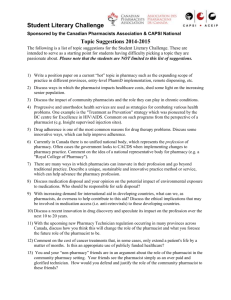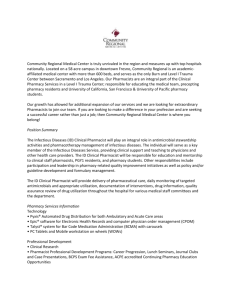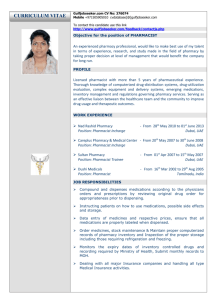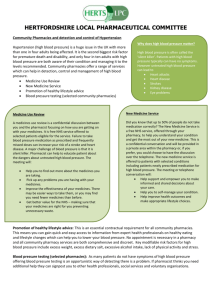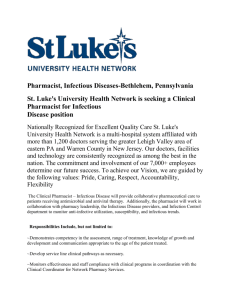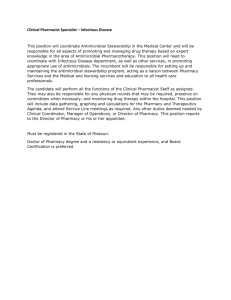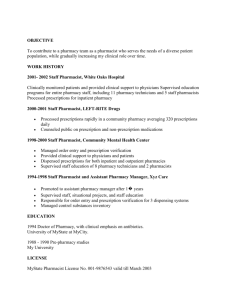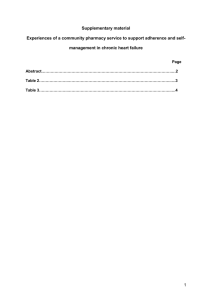MHMM support service specification
advertisement
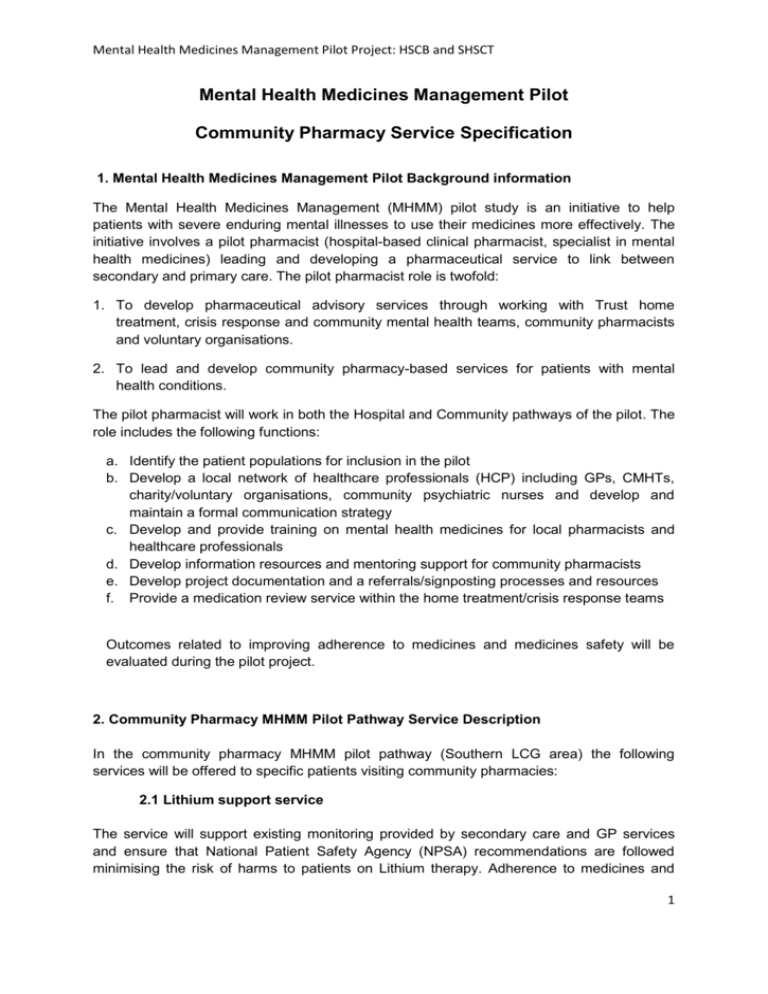
Mental Health Medicines Management Pilot Project: HSCB and SHSCT Mental Health Medicines Management Pilot Community Pharmacy Service Specification 1. Mental Health Medicines Management Pilot Background information The Mental Health Medicines Management (MHMM) pilot study is an initiative to help patients with severe enduring mental illnesses to use their medicines more effectively. The initiative involves a pilot pharmacist (hospital-based clinical pharmacist, specialist in mental health medicines) leading and developing a pharmaceutical service to link between secondary and primary care. The pilot pharmacist role is twofold: 1. To develop pharmaceutical advisory services through working with Trust home treatment, crisis response and community mental health teams, community pharmacists and voluntary organisations. 2. To lead and develop community pharmacy-based services for patients with mental health conditions. The pilot pharmacist will work in both the Hospital and Community pathways of the pilot. The role includes the following functions: a. Identify the patient populations for inclusion in the pilot b. Develop a local network of healthcare professionals (HCP) including GPs, CMHTs, charity/voluntary organisations, community psychiatric nurses and develop and maintain a formal communication strategy c. Develop and provide training on mental health medicines for local pharmacists and healthcare professionals d. Develop information resources and mentoring support for community pharmacists e. Develop project documentation and a referrals/signposting processes and resources f. Provide a medication review service within the home treatment/crisis response teams Outcomes related to improving adherence to medicines and medicines safety will be evaluated during the pilot project. 2. Community Pharmacy MHMM Pilot Pathway Service Description In the community pharmacy MHMM pilot pathway (Southern LCG area) the following services will be offered to specific patients visiting community pharmacies: 2.1 Lithium support service The service will support existing monitoring provided by secondary care and GP services and ensure that National Patient Safety Agency (NPSA) recommendations are followed minimising the risk of harms to patients on Lithium therapy. Adherence to medicines and 1 Mental Health Medicines Management Pilot Project: HSCB and SHSCT recommended laboratory monitoring will be checked. Where appropriate, patients may be referred or signposted to other services. 2.2 High dose antipsychotic screening, education and advice The service will support patients visiting the pharmacy who receive high dose antipsychotic medication by providing them information and education about their medicines. Where further support and advice is required and this cannot be provided by the pharmacy, the patient will be referred or signposted to other health and social care providers or support organisations that may be able to assist them. 3. Community Pharmacist Resources and Training Mandatory training for all community pharmacists participating in the pilot will be provided on all aspects of the pilot services by the Trust-based MHMM pilot pharmacist and HSCB pharmaceutical adviser. Mentoring and support will also be available from the pilot pharmacist and from the HSCB pharmaceutical advisory team. A specialist mental health medicines resource, an information website entitled “Choice and Medication” has been commissioned for the duration of the pilot and is freely available to all healthcare professionals and patients in NI. Links are available on the local HSC websites to facilitate easy accessibility for hospital and community pharmacists and other healthcare professionals. Training on the appropriate use of this resource will be provided to participating community pharmacists. 4. Aims of the Community Pharmacy MHMM Pilot Pathway Service The community pharmacy MHMM pilot service aims to maximise benefits of mental health medicines to patients by: a. identifying people taking specific medicines for mental health conditions where issues of concern exist; b. providing better access to medicines advice c. optimizing adherence to prescribed medicines; d. improving clinical outcomes; e. reducing medicines waste f. reducing the risk of harm through non-adherence to mental health medicines 2 Mental Health Medicines Management Pilot Project: HSCB and SHSCT 5. Service Specifications 5.1 Lithium Support A Lithium support service (LSS) can be carried out for all patients who are having Lithium dispensed. This should be carried on each occasion a new prescription is presented by the patient for dispensing up to a maximum of six occasions during the pilot project. 5.1.1 5.1.2 5.1.3 5.1.4 5.1.5 5.1.6 5.1.7 5.1.8 5.1.9 All patients receiving the LSS service must sign a consent form which allows the pharmacy contractor to share information from the LSS care plan with the patient’s GP as necessary, healthcare and social care practitioners and other health and social care bodies for the purposes of administering and managing health and social care services, the MHMM pilot pharmacist as part of the pilot evaluation, and HSCB officers to verify that the service has been delivered by the pharmacy as part of postpayment verification. All pharmacists providing the service will have attended the mandatory training for the Community Pharmacy MHMM Pilot Pathway Service. The pharmacist will use the LSS care plan to help assess any problems patients have with their lithium therapy and check the patient’s Lithium monitoring card to help develop the patient’s knowledge of their medicine and the importance of monitoring to ensure safety. The pharmacist will use the Choice and Medication (C&M) website resource to help develop the patient’s knowledge of their medicine and the importance of monitoring to ensure safety. With each new prescription the pharmacist will check the that the following information is recorded in the patient’s Lithium Therapy Record Book and is up to date : Current lithium blood level. Thyroid function test results Renal function test results. Weight and BMI. The pharmacist will remind the patient or their carer to take their Lithium Therapy Record Book when they visit the clinic/GP and the pharmacy. The pharmacist will provide medicines management advice to the patient or carer to support their lithium therapy (See guidance notes and SOP template). The pharmacist will complete the MHMM pilot LSS care plan for the patient at each encounter and where necessary, e.g. if there are concerns about side effects or interacting drugs, contact the prescriber to ensure appropriate follow up. The pharmacist will refer any patients to the MHMM pilot pharmacist using a written MHMM pilot referral form. Records of referrals should be made on the MHMM pilot referrals record and may be made on the patient’s pharmacy record when the pharmacist deems it to be of clinical significance. Pharmacy staff will inform or advise people visiting the pharmacy of other health and social care providers and support organisations, such as patient groups, when appropriate. 3 Mental Health Medicines Management Pilot Project: HSCB and SHSCT 5.1.10 The pilot pharmacist will provide pharmacies in their area with details of health and social care providers to whom patients can be referred e.g. GPs, Dentists and Trusts. Likewise contact details for local patient and support groups can similarly be provided to pharmacies. 5.1.11 The pharmacy will collect data on the provision of this service and provide this to the pilot pharmacist for the purpose of evaluating the pilot. 5.2 High dose antipsychotic screening, education and advice An education and advice support service can be carried out for all patients who are taking high dose antipsychotics. 5.2.1 The pharmacist will use the High Dose Antipsychotics screening tool to help identify any patients on high dose antipsychotics. 5.2.2 All patients receiving the High Dose Antipsychotic screening service must sign a consent form which allows the pharmacy contractor to share information with the patient’s GP as necessary, healthcare and social care practitioners and other health and social care bodies for the purposes of administering and managing health and social care services, the MHMM pilot pharmacist as part of the pilot evaluation, and HSCB officers to verify that the service has been delivered by the pharmacy as part of post-payment verification. 5.2.3 Pharmacists providing the service will have attended the mandatory training for the Community Pharmacy MHMM Pilot Pathway Service. 5.2.4 The pharmacist will use the Choice and Medication (C&M) website resource to help develop the patient’s knowledge of their medicine and the importance of monitoring to ensure safety. 5.2.5 The pharmacist will refer any patients to the MHMM pilot pharmacist using a written MHMM pilot referral form. 5.2.6 Records of referrals should be made on the MHMM pilot referrals record and may be made on the patient’s pharmacy record when the pharmacist deems it to be of clinical significance. 5.2.7 Pharmacy staff will inform or advise people visiting the pharmacy of other health and social care providers and support organisations, such as patient groups, when appropriate. 5.2.8 The pilot pharmacist will provide pharmacies in their area with details of health and social care providers to whom patients can be referred e.g. GPs, Dentists and Trusts. Likewise contact details for local patient and support groups can similarly be provided to pharmacies. 5.2.9 The pharmacy will collect data on the provision of this service and provide this to the pilot pharmacist for the purpose of evaluating the pilot. 4
